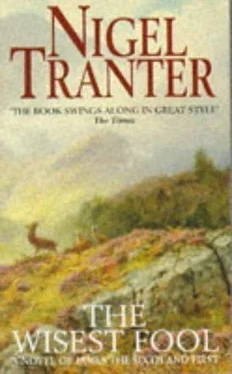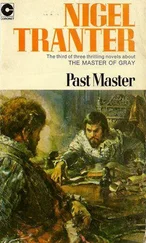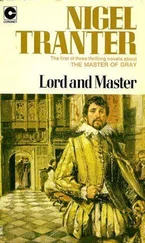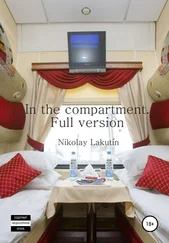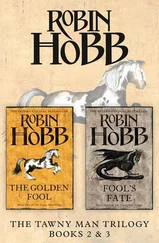Nigel Tranter - The Wisest Fool
Здесь есть возможность читать онлайн «Nigel Tranter - The Wisest Fool» весь текст электронной книги совершенно бесплатно (целиком полную версию без сокращений). В некоторых случаях можно слушать аудио, скачать через торрент в формате fb2 и присутствует краткое содержание. Жанр: Исторические приключения, на английском языке. Описание произведения, (предисловие) а так же отзывы посетителей доступны на портале библиотеки ЛибКат.
- Название:The Wisest Fool
- Автор:
- Жанр:
- Год:неизвестен
- ISBN:нет данных
- Рейтинг книги:4 / 5. Голосов: 1
-
Избранное:Добавить в избранное
- Отзывы:
-
Ваша оценка:
- 80
- 1
- 2
- 3
- 4
- 5
The Wisest Fool: краткое содержание, описание и аннотация
Предлагаем к чтению аннотацию, описание, краткое содержание или предисловие (зависит от того, что написал сам автор книги «The Wisest Fool»). Если вы не нашли необходимую информацию о книге — напишите в комментариях, мы постараемся отыскать её.
The Wisest Fool — читать онлайн бесплатно полную книгу (весь текст) целиком
Ниже представлен текст книги, разбитый по страницам. Система сохранения места последней прочитанной страницы, позволяет с удобством читать онлайн бесплатно книгу «The Wisest Fool», без необходимости каждый раз заново искать на чём Вы остановились. Поставьте закладку, и сможете в любой момент перейти на страницу, на которой закончили чтение.
Интервал:
Закладка:
Immediately all was transformed. Like a regiment of maniacs the hitherto so disciplined and motionless line of servants hurled themselves upon the laden tables. Grabbing up the piled dishes and platters of meats and confections, they flung all to the floor at the far side of the tables, in a rain of ruined refections, smashed sweets, damaged delicacies and spilt spirits, spattering the wall-panelling, piling up in heaps, spreading over the floor. On and on the servants went, as though frenzied, while the great company shouted and yelled and groaned, even wept, in pain and fury, until there was not a dish nor sweet nor receptacle left on the line of tables. Pandemonium reigned. Then, with the enraged guests surging forward and the attendants turned to fight them off, a single trumpet-blast sounded, the hall doors were thrown open, and, led by fiddlers playing a jigging Scots air, in marched a new and seemingly endless regiment of cooks and scullions bearing trays, salvers, platters, cauldrons, flagons, larger and finer model animals, birds and fishes, soups steaming richly, a whole ox roasted, still with its horns and hooves, peacocks with spread tails and a host of similar provisions, to more than fill those emptied tables. And, bringing up the rear, carried by four young pages all in white satin, was a twice-life-sized naked woman, sculpted in sugar, flesh-tinted, nipples coloured, hair contrived, where proper, in gold-leafed toffee tendrils.
The shouting and anger changed to cheering and acclaim. James Hay bowed to the King and Queen and waved and grinned to all the guests, before, with a flick of his hand, dismissing the army of domestics.
"Aye, maist ingenious," James declared, a little breathlessly. "But a fell waste o' meats, man!"
"It is called the ante-dinner, or double-dinner, Sire. As they do it in the Papal States, I understand. With, h'm improvements I"
"Is that so? Well-we'll no' trouble the Cardinal-man, this time, but just set to-in case you breenge it a' awa' again. You've f ah set my belly rumbling."
When none could eat more and before a similar stage was reached with the wines, James presented his gifts, Heriot assisting and identifying. Clearly he gained much satisfaction from the exercise, especially from the little speech he made, with each item, in the language of its recipient, a feat certainly no other prince of Christendom could have rivalled. Whether all the happy assignees were able to understand the wet and thick-tongued allusions, in the rich Scots accent, was another matter. Of quite a number of the items James asked Heriot the cost, sotto voce, in the process, and, when sufficiently impressed, passed on the information like-wise with the gift.
When this was over, a move was made outside, to view the succession of masques, spectacles, tableaux, mimodramas and set pieces in the gardens-although only with reduced numbers of spectators, it is to be feared, strange and exotic liquors having had some equally strange effects, especially on top of some of the more ratified dishes. Some of the entertainments were allegorical, epic, historical or moral, Messrs. Jonson, Jones and Campion having been given more or less a free hand; but others were merely diverting and catered for all tastes. The King's own tastes were catholic, and he appeared to get as much enjoyment out of a piece wherein a lot of little boys disguised as bottles danced and capered round a man in the guise of a great tun, spewing out coloured water as wine, as over an elaborate and erudite charade by Sir Francis Bacon, wherein Peace and Plenty cast their generous offerings before His Pacific Majesty in the shape of a crowned lion, with War, represented by a most loathsome dragon, being continuously stabbed, to the effusion of large quantities of red blood, by a succession of angel-knights with handsome wings sprouting from their shining armour.
As ever, of course, the King began to tire of all this, sooner rather than later and commenced to steer his party gradually towards the large lake where, on an islet, only reachable by tw0 available gondolas, a special pavilion had been erected amongst the trees and stocked with bottles, flagons and playing-cards. Since the gondolas only held four each at most, in addition to the gondoliers, a considerable weeding-out of hangers-on was expeditiously achieved, with Robin Carr instructed, in stage-whispers, whom to include. Some of the most successful gamblers in two kingdoms, more especially the northern one, largely new viscounts but including the English Earls of Montgomery and Southampton, were duly ferried across to the island in relays, whilst Carr was sent in search of the wealthiest known guests, to invite, also in relays, as a mark of especial royal esteem, to make brief pilgrimage to the shrine.
At this stage, George Heriot conceived his duty done and melted away into the shrubbery, to go in search of Alison who had remained with the Queen.
It was early evening, with the thought of the fourteen-mile barge-journey down-river beginning to exercise his mind and Alison about to seek formal permission to leave the Queen's entourage, that Heriot learned that his liege lord had not yet, in fact, finished with him for the day. He learned it from the supercilious lips of Carr, Viscount Rochester, no less, sent in person to find and conduct him to the island. They made a silent journey of it Only one gondola survived-the other apparently having sunk without trace-and at both the little jetties and at the pavilion entrance Yeomen stood guard. Within the tent was a picture of chaos. Tables were overturned, bottles, flagons and tankards lay everywhere, playing-cards littered the trampled grass and, amidst all, bodies snored and twitched and grunted. Three men remained upright, all Scots-James himself, at the head of a table, James Hay, Viscount Doncaster, at one side of him and John Ramsay, Viscount Haddington, at the other; although admittedly the Archduke Albert of Hapsburg remained approximately in his chair but sprawled helplessly across the swimming table. Beside the three Scots were sizeable piles of specie, gold pieces, rings, jewelled brooches, crosses of knightly orders and, Heriot was interested to note, sundry of the costly gifts he had so carefully manufactured for this day. The King, beaker in hand, waved genially. "Aye, Geordie- come you. Drink a cup o' wine wi' me. Whaur hae you been hiding yoursel’?" His voice was neither thicker nor more slurred than usual. "I have latterly been talking with His Highness the Prince of Wales, Sire. In his room."
"You have?" James nodded. "Dutious. Aye, my Annie would send you there. She has a notion our Henry will die, has Annie. Think you so, Geordie?"
Heriot swallowed. "I… I do not know, Sire. But-God forbid! I am no physician. He seemed brighter, stronger, I thought"
"Aye, he's bright, all right Ower bright, maybe, the laddie. I hope he doesna die, Geordie." "No, She. I pray that he will not"
"Aye-you pray. But meantime, come you and sit by me. Here. Johnnie, Jamie-up wi' you. Off! You too, Robin Carr-out! I want a word wi' my Fiduciary. Aye, and you can leave the winnings where they are see you-they'll come to nae harm in Geordie Heriot's care!"
When the other three had bowed themselves out, leaving only the unconscious drunks, James gestured to the three heaps of spoil. 'You hae yon kist o' yours, some place? Och, it'll no' need to go back toonl And, here." He dug into a pocket of his padded doublet for a bunch of crumpled papers. "Some notes o' hand, just. There's one for seven hundred pounds frae Philip Montgomery. You'll ken better than I do whether his credit will stand it? But, och-we'll no' can be too hard on the laddie, mind. And here's one for eight thousand, five hundred guilders frae yon fat Dutchman. I dinna ken how much that is-you'll hae to work it out for me, Geordie. You'll see to it a'?" 'Yes, Sire. A, a profitable afternoon!"
Читать дальшеИнтервал:
Закладка:
Похожие книги на «The Wisest Fool»
Представляем Вашему вниманию похожие книги на «The Wisest Fool» списком для выбора. Мы отобрали схожую по названию и смыслу литературу в надежде предоставить читателям больше вариантов отыскать новые, интересные, ещё непрочитанные произведения.
Обсуждение, отзывы о книге «The Wisest Fool» и просто собственные мнения читателей. Оставьте ваши комментарии, напишите, что Вы думаете о произведении, его смысле или главных героях. Укажите что конкретно понравилось, а что нет, и почему Вы так считаете.
